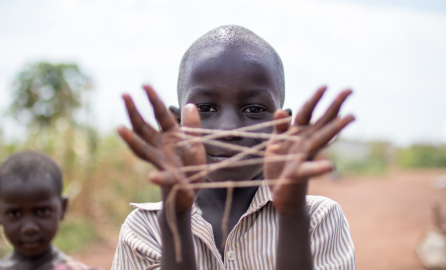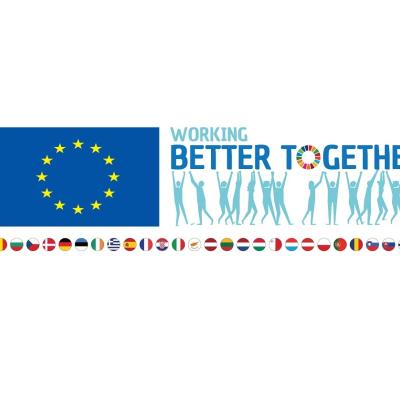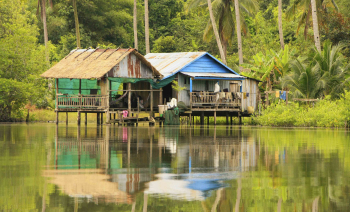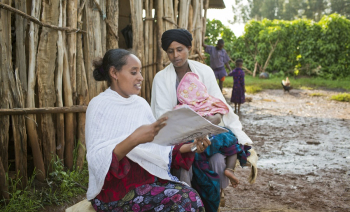This article is also available in French.
Togo, one of Africa’s smallest country, bordered by Ghana, Benin, and Burkina Faso, signed with the EU, together with Germany and France, a joint programming document for the period of 2014-2020. Vincent Vire, Head of Cooperation at the European Delegation in Lomé is sharing insights and lessons learnt about this mechanism, which he said: "reinforced European development cooperation and political dialogue as well as the image of an EU ‘collective voice.'"
|
Despite divergences in historical, linguistic and cultural links between European countries and a third country, there are common strategic interests, sectors of intervention and joint actions that can be identified to set a common agenda for development cooperation. |
Capacity4dev: Is it possible for all European partners to agree on the implementation of a country's development cooperation?
Vincent Vire: It is possible, and highly desirable, for the European partners to consult and coordinate the identification of their sectors of intervention and development programmes in a particular country. Joint Programming encourages a joint analysis of strategic interests and challenges in the partner country. The identification of priority sectors of intervention is tailored to the partner country's development strategy. This process of joint reflection often leads to joint responses in certain priority sectors. Joint programming does not, however, necessarily lead the European partners to agree on all the sectors of intervention and on a perfect division of labour in each sector, or to implement joint programs in all the sectors identified. Once European partners identify a common priority sector of intervention, there is a possibility of formulating a joint action. At least, it allows the formulation and implementation of the envisaged actions that should be closely coordinated between Member States (MS) and European bodies.
Capacity4dev: What were the challenges in Togo and how did you overcome them?
Vincent Vire: Germany and France are two active EU Member States in Togo. Both countries have close ties with Togo due to their colonial past. This did not prevent the EU, together with Germany and France, from preparing a joint programming document (JPD) for the period of 2014-2020. The agreement was signed with some delay in June 2016. This strategic document lists the commitments of each European partner in the scope of the Strategy for Accelerated Growth and Employment Promotion (SCAPE) in Togo 2013-2017.
In the following video produced by the EUD in Lomé, key stakeholders reflect on the impact of the JP in Togo.
Overall, the Joint Programming process has been extremely useful in terms of closer cooperation between the EU and the Member States (MS). A reinforced joint action occurs at the level of coordinated development cooperation, as well as at the level of a strengthened political dialogue, both of which are even more mutually reinforcing with joint action.
|
The process has fostered a harmonised common analysis, vision and communication. Joint Programming document has reinforced European development cooperation and political dialogue as well as the image of an EU “collective voice”. |
If we had to summarize the biggest challenges encountered during this joint programming, I would state:
-
Long process: The Joint Programming exercise has been a long process affected by the change of European staff (including the German and French Ambassadors) and the local context (i.e., elections 2013 and 2015, new national development strategy SCAPE). The Joint Programming process was initiated in 2012, but the JPD was not finalized until the end of 2015 and signed six months later during the visit of the Director for West and Central Africa to Togo.
-
Schedule of bilateral programming: The EU and MS already had ongoing bilateral programming processes. Thus, it was difficult to harmonise, concentrate and divide the work. It was eventually impossible to use the JPD to replace the bilateral programming documents. However, the JPD had integrated the interventions planned by the Member States into their cooperation strategies for Togo. Finally, the timing was not coordinated. The member states' programming covers a 3-4-year period; therefore, it was impossible to integrate the European Joint Programming Document into the full volume of Member States' cooperation over the 2014-2020 period.
-
EU funding diversity: In practice, the EU remains involved in a wide range of sectors in Togo because of its many priorities for external action. Moreover, the EU has different financial instruments to meet their objectives in the region (e.g., regional programme, budget lines, Intra-ACP funds, Instrument for Stability, etc.). However, this funding was not known at the time of the preparation of the JPD. Hence, it was not possible to integrate these EU actions in Togo, since they were financed from other funds. The picture of EU actions in Togo in the JPD was thus incomplete. There was finally no real division of labour between the EU and its MS in Togo, as the EU ended up being involved in many more sectors than indicated in the JPD. This situation does not facilitate the task for a concentration and division of labour and coordinating EU actions with MS.
-
Lesson learnt n° 3 Joint Programming is based on joint analysis of the countries' development strategies for the planned interventions to be fully consistent with the country's development agenda. When the EU and its Member States join forces in a sector and co-finance interventions, the coherence of development projects increases significantly. It avoids duplication and maximises the impact of allocated resources.
Bilateral interests: MS have bilateral interests, of course, and it is therefore not always easy to try to harmonise messages and to seek an effective concentration or division of labour. However, regular meetings between the EU and MS, as well as with other members known as “the Group of 5” in Togo (EU, France, Germany, the USA and UN), have generally resulted in agreement on common advocacy and lines of action.
Thus, because of these challenges, it must be admitted that the Joint Programming Document (CPD) did not serve as a single programming document for the EU, Germany and France, and it did not really result into a division of labour in the priority sectors of cooperation defined by the EU and the MS. However, it strongly influenced the bilateral programming processes of the EU and the MS conducted in parallel and strengthened them by pooling an analysis of the problems, and seeking a joint response, whether through cooperation in development or political dialogue. Subsequently, this has greatly favoured cooperation opportunities with the French Development Agency (AFD) and German development cooperation (German acronym GIZ and the German Kreditanstalt für Wiederaufbau (KFW “Credit Institute for Reconstruction") in the programs funded by the EU under the 11th European Development Fund (EDF) for the period 2014-2020.
In the following video produced by the EUD in Lomé, the German Ambassador to Togo, the Head of GIZ and the Togolese President of the Delegation of Atakpamé share their views on the joint programming implemented in Togo.
Capacity4dev: Joint Programming proposes to strengthen the coherence of projects, what does this mean in practice?
Vincent Vire: Let’s take two examples to illustrate this point, in the sectors of decentralisation and agriculture. During the Joint Programming, the EU Delegation informed the European partners of its intention to support the town halls (called Special Delegations) of the principal towns of the five regions of Togo in the sanitation sector. Germany was already involved in the decentralisation sector in three cities in Togo. Germany prepared a project to build town halls for local elections. It was thus agreed to prepare a joint decentralisation support project with the involvement of Germany (EUR 19 million, of which EUR 14 million from the EU) and the implementation of GIZ.
This cooperation made it possible to target the five main towns and eight secondary towns, thus extending the number of towns benefiting from Germany's initial support. EU funding has also made it possible to strengthen Germany's action by integrating public universities and opportunities for decentralised cooperation between Togolese and European cities. A landfill construction project implemented by Lomé City Council was likewise co-financed by joint funds of the EU and AFD. In another sector, Germany had a project to support agricultural production. The EU joined this project with EUR 5 million of funding specifically focused on supporting pineapple processors, including promoting exports to Europe. Thus, the EU funding facilitated the whole value chain in the pineapple sector, whereas the GIZ’s support was mainly focused on production.
|
The PEREL programme (rehabilitation and reinforcement of the Lomé electricity distribution network) co-financed by AFD (EUR 30 million concessional loan), the EU (EUR 8 million grant) and KFW (EUR 10 million grant) is an excellent example of joint EU/MS Joint Programming and implementation. |
Capacity4dev: What are the projects born out of Joint Programming in Togo?
Vincent Vire: As mentioned, the Joint Programming process has fostered opportunities for cooperation with AFD and GIZ in programmes financed by the EU under the 11th EDF. During the period 2014-2020, seven contracts have been signed with AFD and GIZ for a total amount of EUR 56 million: four contracts with AFD in the energy sector (i.e., EUR 8M + EUR 15M in preparation) and one water and sanitation (i.e., EUR 14.3M); as well as two contracts with GIZ regarding the decentralization (EUR 14M) and pineapple processing sector (EUR 4.7M). KFW has also joined one of the contracts with AFD in the energy sector, the first project with EU-Germany-Togo tripartite financing.
In our opinion, the programme of extension of Lomé electricity network (French acronym: PEREL) is an excellent example of joint EU and MS programming and implementation for several reasons:
-
Joint dialogue on governance: During the preparation phase of the project, in-depth discussions took place between the donors (EU and AFD, the development bank KFW joined the project later) and the authorities (the National Electricity Distribution Company (CEET), the Ministry of Energy, and the Ministry of Finance). The discussions concerned economic governance and necessary reforms to ensure the sustainability of the EU actions. Thus, for the first time in the country's history, it was possible to carry out an independent financial and technical audit of a public company (namely, the CEET). Moreover, the corrective measures were discussed with the three Ministers, members of the Board of Directors. At the same time, the EU provided for indicators in the variable tranche of its budget support programme linked to cross-debt consolidation actions by the CEET, considered as a prerequisite action for the finalisation of the PEREL.
-
Roles division: AFD has assumed the leading role as an executive implementation agency of this project. However, the EU and KFW remain closely involved in the sector policy dialogue. It remains essential to ensure the sustainability of the intervention, as well as the impact of the investments on the final beneficiaries. The delegation of EU funds to AFD, therefore, allows the Delegation's human resources to be concentrated on dialogue with the authorities and on more strategic tasks (planning of EU External Investment Plan (EIP) interventions, structured dialogue with the private sector, exchanges on sector reforms, updating of the national electrification strategy, enhancement of opportunities offered by carbon finance, etc.).
-
Sectorial coordination: Prior consultation between the EU, AFD and KFW on the key topics to be discussed with the authorities gives much greater political and technical weight to our messages and contributes to better sectoral coordination between technical and financial partners (TFPs) and the Government. The cooperation between the EU and AFD in this new EU focal sector in Togo for 2014-2020 has led us to initiate a coordination group between TFPs in a first phase, which has subsequently expanded and is now chaired by the Ministry of Energy.
-
Development of other joint interventions: The European approach based on sectoral dialogue, governance and a long-term vision subsequently made it possible to propose other interventions throughout the country and to contribute to better management of the sector. A hydroelectric dam project had been envisaged with co-financing from the EU, AFD and the European Investment Bank, but had to be abandoned following inconclusive technical studies. A project to rehabilitate and reinforce the electricity distribution network of 53 localities throughout Togo co-financed by AFD and the EU (and possibly KFW) is currently being approved.
In the following video produced by the EUD in Lomé, François Jacquier-Pellisier, Head of AFD and Dr. Günther Roos, KFW Director for Togo and Benin reflect on their cooperation with the EU to working better together in Togo.
Capacity4dev: As the representative for development cooperation in the European Delegation in Lomé, what have you learnt from the Joint Programming?
Vincent Vire: In general, the Joint Programming process, even if it has sometimes been tedious, in particular, due to staff changes and different bilateral programming processes, has clearly led to closer cooperation between the EU, Germany and France; not only at the level of development cooperation but also at the level of political dialogue. The process has fostered a harmonised and common analysis, vision and communication, which has strengthened the weight of our cooperation and political dialogue. Joint Programming has made it possible to compile and publish information on focal sectors for the EU and MS.
|
Joint Programming initially "forced" the EU Delegation to Togo and the Member States to work more and better together, a process which is as of now completely natural. |
This has reinforced the EU “collective voice” regarding the development cooperation and the promotion of democratic values. Joint Programming has also strengthened the search for joint responses. It has thus strongly influenced the bilateral programming processes of the EU and MS conducted in parallel and has promoted opportunities for cooperation with AFD and GIZ in EU-funded programmes under the 11th EDF.
Overall, Joint Programming is, therefore, a remarkably positive initiative not only for the EU and the Member States but of course, also for Togo.
Find out more:
-
The Joint Programming tracker offers a detailed overview of joint programming around the world. It is an online application managed by DEVCO.A2 and provides details of the status in each partner country. A dedicated page is available for Togo where you can find the joint strategy.
-
Listen to "Voices from the Field" videos on Joint Programming
-
Read about the Joint Implementation with the EU Practitioners’ Network: Lessons Learnt and Good Practices
Credit: Videos © European Union Delegation in Lomé | Photo © Alex Radelich





Log in with your EU Login account to post or comment on the platform.